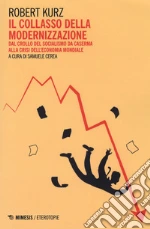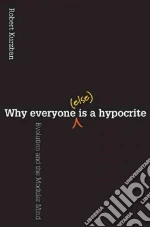 Libri di Robert Kurz su Unilibro.it) Libri di Robert Kurz su Unilibro.it)
|
|
2022 |
 Title :
Il capitale mondo. Globalizzazione e limiti interni del moderno sistema produttore di merce
Title :
Il capitale mondo. Globalizzazione e limiti interni del moderno sistema produttore di merceAuthor: Kurz Robert Publisher: Meltemi La crisi del mondo globalizzato procede inarrestabile e in maniera convulsa su ogni piano: economico, sociale, politico, ecologico... Ma quale ne è la causa? È davvero lecito individuare la radice della crisi della società postmoderna in fattori isolati quali la supremazia della finanza sull'"economia reale", il tramonto dello Stato-nazione e della democrazia rappresentativa o il conflitto tra demagogia populista e "ribellione delle élite"? O forse questi non sono altro che sintomi di uno sconvolgimento più profondo sul terreno della modernità? Ne "Il capitale mondo", Robert Kurz intende dimostrare che la crisi del mondo globalizzato è un esito necessario della logica del sistema-mondo capitalistico e che l'unica "riforma" possibile del suo funzionamento coincide con il suo sovvertimento definitivo. € 30,00
Scontato: € 28,50
|
|
|
2017 |
 Title :
Il collasso della modernizzazione. Dal crollo del socialismo da caserma alla crisi dell'economia mondiale
Title :
Il collasso della modernizzazione. Dal crollo del socialismo da caserma alla crisi dell'economia mondialeAuthor: Kurz Robert; Cerea S. (cur.) Publisher: Mimesis L'euforia liberale seguita al tracollo del comunismo ha completamente travisato la vera natura del socialismo reale e della sua crisi, identificandola con la fine ingloriosa di un'aberrazione storica cui avrebbe dovuto subentrare una nuova era di prosperità da economia di mercato. Ad un quarto di secolo da quegli eventi (e a cento anni esatti dalla Rivoluzione d'ottobre) sappiamo però che le cose sono andate in maniera molto diversa. Il presente volume, pubblicato in Germania nel 1991, si propone di analizzare il crollo del socialismo reale nel contesto di una crisi più ampia del sistema mondiale della merce (alias capitalismo), di seguirne le vicende allo scopo di individuare i lineamenti fondamentali di un processo di crisi che sta iniziando a colpire negli ultimi anni, in maniera convulsa, lo stesso Occidente. € 18,00
Scontato: € 17,10
|
|
|
1916 |
 Title :
The Hidden Agenda of the Political Mind
Title :
The Hidden Agenda of the Political MindAuthor: Weeden Jason, Kurzban Robert Publisher: Princeton Univ Pr € 21,50
|
 Title :
Evolutionary Psychology
Title :
Evolutionary PsychologyAuthor: Kurzban Robert (EDT) Publisher: Sage Pubns Ltd € 1123,10
|
|
2015 |
 Title :
Le crepe del capitalismo
Title :
Le crepe del capitalismoAuthor: Kurz Robert Publisher: Bepress Il capitalismo non è l'eterno ritorno ciclico dell'identico, ma un processo storico dinamico. Ogni grande crisi si incontra a un livello di accumulazione e di produttività superiore a quelle del passato. Quindi, la questione della gestibilità o non gestibilità della crisi si pone in forma sempre nuova. I precedenti meccanismi di soluzione perdono validità. Le crisi dell'Ottocento furono superate perché il capitalismo ancora non aveva coperto tutta la riproduzione sociale. C'era ancora spazio interno per lo sviluppo industriale. La crisi economica mondiale degli anni '30 rappresentò una rottura strutturale a un livello di industrializzazione molto più elevato. Essa fu dominata grazie alle nuove industrie fordiste e grazie alla regolazione keynesiana, il cui prototipo furono le economie di guerra della seconda guerra mondiale. Quando l'accumulazione fordista urtò contro i suoi limiti, negli anni '70, il keynesianismo sfociò in una politica inflazionaria, sulla base del credito pubblico. La cosiddetta rivoluzione neoliberale, intanto, spostò solo il problema dal credito pubblico ai mercati finanziari. Lo sfondo era una nuova rottura strutturale dello sviluppo capitalista, causato dalla terza rivoluzione industriale della microelettronica. Il libro in questione è una raccolta di saggi sul capitalismo e le sue derive, in cui il filosofo tedesco analizza in modo critico, attraverso una revisione continua della crisi del capitalismo, la sua possibile fine. € 7,00
Scontato: € 6,65
|
|
|
1914 |
 Title :
The Hidden Agenda of the Political Mind
Title :
The Hidden Agenda of the Political MindAuthor: Weeden Jason, Kurzban Robert Publisher: Princeton Univ Pr When it comes to politics, we often perceive our own beliefs as fair and socially beneficial, while seeing opposing views as merely self-serving. But in fact most political views are governed by self-interest, even if we usually don't realize it. Challenging our fiercely held notions about what motivates us politically, this book explores how self-interest divides the public on a host of hot-button issues, from abortion and the legalization of marijuana to same-sex marriage, immigration, affirmative action, and income redistribution. Expanding the notion of interests beyond simple economics, Jason Weeden and Robert Kurzban look at how people's interests clash when it comes to their sex lives, social status, family, and friends. Drawing on a wealth of data, they demonstrate how different groups form distinctive bundles of political positions that often stray far from what we typically think of as liberal or conservative. They show how we engage in unconscious rationalization to justify our political positions, portraying our own views as wise, benevolent, and principled while casting our opponents' views as thoughtless and greedy. While many books on politics seek to provide partisans with new ways to feel good about their own side, The Hidden Agenda of the Political Mind illuminates the hidden drivers of our politics, even if it's a picture neither side will find flattering. € 26,80
|
|
|
2014 |
 Title :
Ragione sanguinaria
Title :
Ragione sanguinariaAuthor: Kurz Robert; Cerea S. (cur.) Publisher: Mimesis La crisi della modernità capitalistica è anche la crisi delle sue ideologie legittimatorie. Dopo la fine del socialismo di Stato la critica sociale ha surrogato un marxismo sociologistico con le sempiterne certezze della ragione illuministica. Sarà in nome dei "valori occidentali" e degli ideali illuministici che si realizzerà l'emancipazione umana? La risposta di Robert Kurz è categoricamente negativa: solo la critica fondamentale dell'Illuminismo può essere il presupposto di una prassi in grado di superare la paralisi della società mondiale. € 5,90
Scontato: € 5,61
|
|
|
1912 |
 Title :
Why Everyone Else Is a Hypocrite
Title :
Why Everyone Else Is a HypocriteAuthor: Kurzban Robert Publisher: Princeton Univ Pr We're all hypocrites. Why? Hypocrisy is the natural state of the human mind. Robert Kurzban shows us that the key to understanding our behavioral inconsistencies lies in understanding the mind's design. The human mind consists of many specialized units designed by the process of evolution by natural selection. While these modules sometimes work together seamlessly, they don't always, resulting in impossibly contradictory beliefs, vacillations between patience and impulsiveness, violations of our supposed moral principles, and overinflated views of ourselves. This modular, evolutionary psychological view of the mind undermines deeply held intuitions about ourselves, as well as a range of scientific theories that require a "self" with consistent beliefs and preferences. Modularity suggests that there is no "I." Instead, each of us is a contentious "we"--a collection of discrete but interacting systems whose constant conflicts shape our interactions with one another and our experience of the world. In clear language, full of wit and rich in examples, Kurzban explains the roots and implications of our inconsistent minds, and why it is perfectly natural to believe that everyone else is a hypocrite. € 20,60
|
 Title :
Cultural Analysis
Title :
Cultural AnalysisAuthor: Wuthnow Robert, Hunter James Davison, Bergesen Albert, Kurzweil Edith Publisher: Routledge Discusses theories of culture proposed by four leading sociologists and shows how they have developed a framework for investigating culture € 56,10
|
|
2008 |
 Title :
Wargaming for Leaders
Title :
Wargaming for LeadersAuthor: Herman Mark, Frost Mark, Kurz Robert Publisher: McGraw-Hill If you had the opportunity to probe the future, make strategic choices, and view their consequences before making expensive and irretrievable decisions, wouldn't you take advantage of it? Of course you would. And in a world of asymmetrical conflict, security threats, intense global competition, and economic uncertainty, there is an even higher premium on road-testing plans and strategies--whether they're spearheaded by government organizations, transnational corporations, or emerging megacommunities. Wargaming for Leaders provides a methodology to get at the issues that one leader, no matter how visionary, cannot grasp on his or her own. How? By bringing together the real experts on the topic at hand to wage “cognitive warfare.” Through tapping the collective wisdom surrounding an issue, experts can experience the future in a risk-free environment and find answers to questions that had not been on their radar--often with unexpected and startling results. With examples from the fields of military, corporate, and public policy, three wargaming developers from Booz Allen Hamilton deliver compelling insights on this problem-solving method, including fascinating details on how
Wargaming allows organizations of every type and every size to organize information, plot out scenarios, and tap into the collective expertise of participants. The results allow everyone to identify and tackle obstacles, solve problems, and find new ways to innovate and further performance goals. Get ready for the battle of your organizational life--and prepare to reap the spoils of victory. € 32,00
|
|
|
2003 |
 Title :
Manifesto contro il lavoro
Title :
Manifesto contro il lavoroAuthor: Kurz Robert; Trenkle Norbert; Lohoff Ernst Publisher: DeriveApprodi € 11,00
|
|
|
1994 |
 Title :
L'onore perduto del lavoro. Tre saggi sulla fine della modernità
Title :
L'onore perduto del lavoro. Tre saggi sulla fine della modernitàAuthor: Kurz Robert; Jappe A. (cur.) Publisher: Manifestolibri € 7,75
|